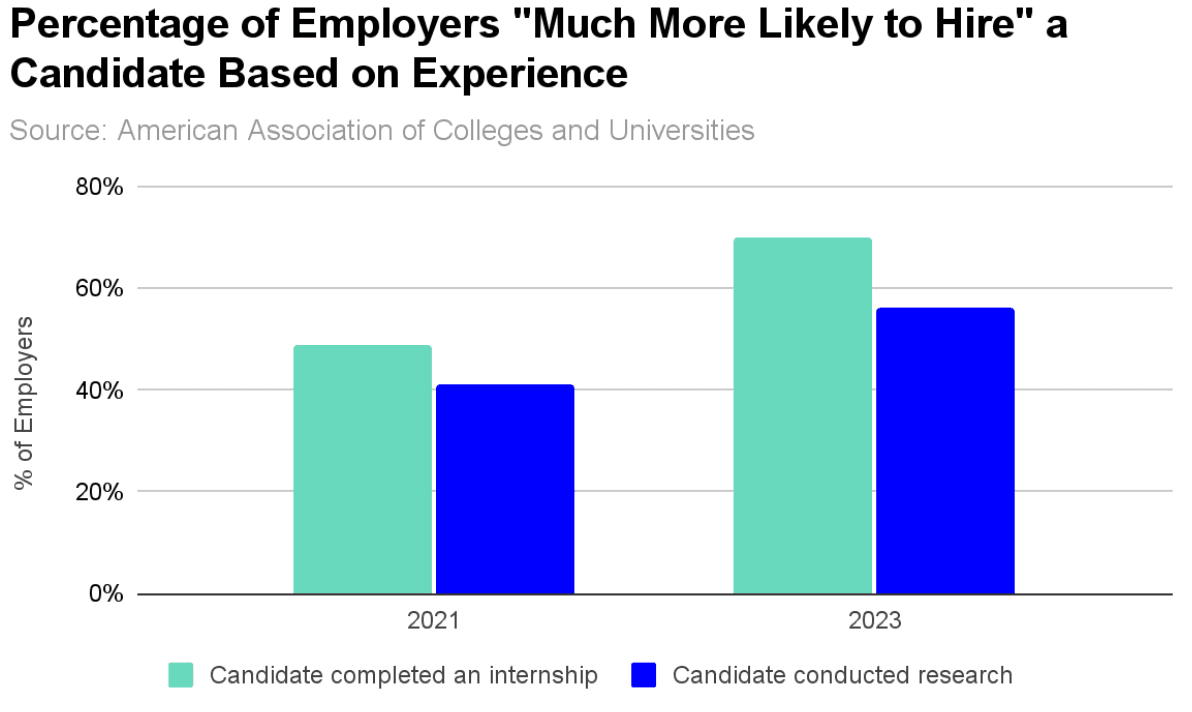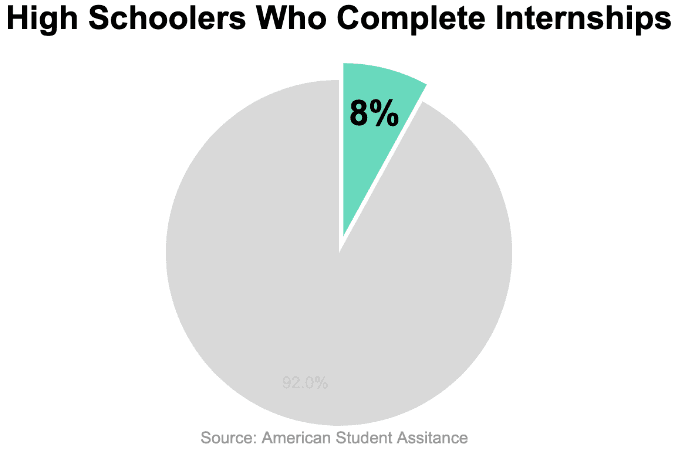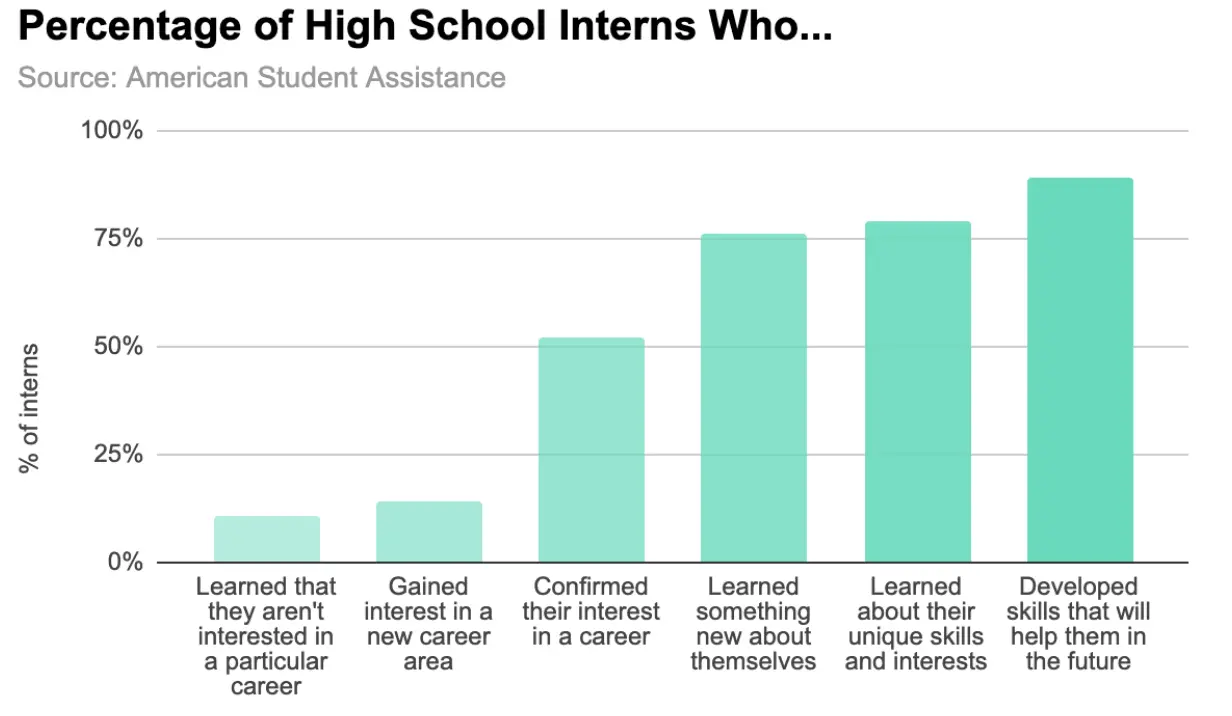Research Programs vs. Internships: Which is Right for You?
8 minute read
SUMMARY
High school students who participate in research programs and internships can profoundly increase their college admissions chance and future career outcomes
Early participation in research programs and internships can provide new opportunities for low income and minority students to be exposed to new academic fields, new skills, and new passions
Virtual research programs like Polygence and remote internships are providing new accessible options to gain critical experience needed for college applications and job experience
Introduction
Is it more valuable to conduct research or to complete an internship? Depending on whether the experience takes place during high school or at the college level, the goals of various programs could differ significantly. In general, though, internships aim to prepare students for industry professions, while students typically conduct research to become experts in a specific academic subject. Despite their seemingly divergent goals, the outcomes tend to converge on a set of similar positive results. First, research opportunities and internships can both lead to lasting mentorships. Past researchers and interns alike cite mentorship as one of the strongest benefits to result from their experiences. Additionally, high school research experiences and internships both prepare participants for postsecondary studies. Both also lead to improved soft skills, such as communication and critical thinking, which are eye-catching to potential future employers (internships completed during college are especially convincing to hiring managers). By analyzing numerical data and written evidence from previous studies, as well as interviews with industry experts, researchers, and students, this report will demonstrate the most salient benefits of research experiences and internships for students.
Why Should You Conduct a Research Project?
Key takeaways:
Conducting research in high school prepares students for college and beyond.
Undergraduates who conduct research develop transferable skills, including communication and critical thinking.
Conducting research at the undergraduate level allows for in-depth academic exploration.
Increasing minority students’ participation in research during high school can improve representation at the university level and in the workforce.
Lasting mentorship is one of the key positive outcomes from research projects.
Internships and research can go hand in hand.
As with internships, there is no single definition of research. Polygence breaks the term down into five distinct types of scholarly activity:
Creative
Review
Exploratory
Constructive/Applied
Empirical
Each of these research types has different emphasis and benefits, so it’s worth digging deeper to understand the differences between them.
Creative research, according to Polygence, “includes diving deep into an area of interest with an existing body of knowledge or past work (e.g. literature, philosophy, anthropology or music)....” Research in the form of a review “surveys past work in a given field and provides a comprehensive overview of the state of the art of that field by describing past achievements and identifying outstanding research questions.” Exploratory research “defines new areas or problems by generating and interpreting data collected from direct observations.” Constructive or applied research “defines and solves real-world problems through tactical engineering or craftwork.” Finally, empirical research “uses reproducible experimentation to measure phenomena and to formulate concrete theories and draw conclusions.”
What are the Professional Benefits of Independent Research?
Conducting research at the undergraduate level allows for in-depth academic study. About 6,000 undergraduate students conduct research through the National Science Foundation each year. A 2018 study showed that Another report from the same year found that, beyond GPA boosts, conducting research increases undergrads’ self-confidence, as well as their awareness of the ins and outs of graduate-level research. A recent U.S. News article highlighted the benefits of doing research during college: “No matter the subject area,” the author asserts, “research participation is an asset for undergrads.”

Although research focuses on depth of understanding in a specific topic, undergraduates who conduct research also develop transferable skills, including communication and critical thinking. A 2018 paper co-authored by mechanical engineering faculty members at The Citadel states that undergraduate research “provides an avenue to develop skills such as utilizing good research methodology, interpreting data, discipline, [and] translating their experiments into presentations to effectively communicate the work they have completed.” From GPA boosts to improved data skills, the academic benefits of undergraduate research are clear.
Surveys by the American Association of Colleges and Universities (AACU) provide evidence for the transferable benefits of undergraduate research from the perspectives of post-graduation employers. According to their 2023 report, 56% of employers responded that they would be “much more likely” to consider a job candidate who conducted research alongside a faculty member during their undergraduate studies. However, internships were even more compelling for employers, 70% of whom were “much more likely” to consider a job applicant with an internship on their résumé. Both of those figures rose since 2021, when the AACU published a similar report showing internships and research swayed 49% and 41% of employers, respectively. Conducting research as an undergraduate, then, comes with increasingly compelling professional advantages in addition to academic ones — even if the professional bonuses are somewhat softer than those associated with completing an internship.

How do Research Opportunities Affect College Admissions?
Conducting research during high school also comes with tangible benefits that prepare students for college and beyond. Kristen Moon, a contributor to Forbes on college admissions, wrote in 2022 that
Research can be a life-changing experience for a high schooler. It gives them a chance to gain hands-on instruction beyond the classroom and be exposed to the dynamics of a lab environment. In addition, students learn how to work with others as they gain analytical, quantitative and communication skills…
Conducting research in high school contributes to students’ academic careers in ways that coursework generally doesn’t. Colleges and universities also value applicants’ research experiences, writes Moon:
Participating in research can also give students a competitive edge when applying to college. This is especially true for candidates of BS/MD programs, where medical-focused activities are expected. Some BS/MD programs, like Rensselaer Polytechnic Institute’s 7-Year Program, are specially designed to train future physician-scientists.
The Columbia Undergraduate Science Journal makes an equally strong case for ambitious high schoolers to conduct research. “Research,” they write, “is a great way to learn new topics and can demonstrate your interest in academic fields, like genetics, astronomy, and chemical engineering. This can help you stand out among other college applicants….” Based on their own observations and analyses, these Columbia University students recommend conducting research as a way to stand out during the college admissions process.
Proprietary data from Polygence supports the link between high school research and admission to highly selective colleges and universities. Polygence is an online research academy that pairs students with expert mentors in their field of choice, guiding them through independent research projects. Data from more than 5,000 completed student projects shows a strong correlation between program participation and admission to R1 research universities (doctoral universities that perform “very high levels of research activities,” according to the Carnegie Classification). One past participant writes,
I included my Polygence research in two major places on my college application: in supplemental materials sections, and in the essay to describe my own passions in the world of academia. My Polygence project was a perfect way to display my intellectual interests, as well as my own initiative and passion to pursue said subjects when they weren’t available to me immediately. Most importantly, I was able to disclose something close to me that was not only extremely personal, but also impactful in the subject I wished to study.
Out of a sample of 590 past participants surveyed in 2023, 96% were admitted to at least one R1 research university. Furthermore, 80% of Polygence students reported that their exposure to intensive research experience heavily influenced their approach to selecting a college major. These data reinforce the observed correlation between high school research projects and admission to top research universities.
Want to Learn More?
Join Polygence and do your own research project tailored towards your passions and guided by one of our expert mentors!
Harvard Admissions Data
Data from Harvard University also suggests that conducting research during high school strengthens applications for undergraduate admission. As discussed in Polygence’s recent white paper (and follow up blog post) analyzing Harvard’s admissions data, admissions officers rank candidates from “1” (best) to “4” (worst) for academic, extracurricular, athletic, and personal excellence. Using data from over 160,000 U.S. applications between 2014 and 2019, analysis of the Arcidiacono data set revealed that applicants receiving a “1” rating in academics were approximately eight times more likely to be offered admission than those receiving a “2” rating.
How do admissions officers assign these scores? According to Harvard’s internal documents, the “2” rating typically represents “perfect, or near-perfect, grades and testing, but no evidence of substantial scholarship or academic creativity”. A “1” rating, on the other hand, describes an applicant with similarly impressive grades and testing, plus “substantial scholarship or academic creativity,” often in the form of an academic paper or other portfolio item demonstrating substantial scholarship. While universities vary in their selection processes, applicants to Harvard can significantly increase their chances of admission by producing and submitting substantial scholarship such as academic research.
What are he Benefits of Research and Mentorship on Career Paths?
The benefits of high school research projects also extend beyond college admissions. A 2022 study found that participating in biomedical research during high school through the University of Alabama’s Summer Science Institute (SSI) had a strong impact on participants' career trajectories: 97% of surveyed past participants of the program reported pursuing STEM careers. According to Patel et al., “nearly all” of the surveyed alumni “indicated their SSI-III experience was very positive and influenced their career decision.” The participants highlighted their mentors as role-models, especially the younger mentors (graduate students and postdoctoral fellows).
Finally, self-assessments from participants showed perceived improvements in academic writing, oral communication skills, working independently, and working as a member of a team, as well as much stronger interest in a career that includes research.
Diversifying Fields of Research
Conducting research in high school seems to have lasting impacts on academic and professional career trajectories. Indeed, there is mounting evidence showing that improved access to research for high school students can even increase minority representation at higher levels.
Studies show that raising minority students’ participation in research during high school can improve representation in university research and in the professional scientific workforce. Chuisano et al. write, “Engaging high school students in a research training program is advantageous because postsecondary decisions and occupational interests are often crystallized and plans formulated during adolescence.” A 2014 evaluation of a summer health science research program for minority high schoolers in California found that, after completing the program, 87% of participants intended to pursue careers in research; before participating, that number was just 23%. The participants also self-reported large gains in “scientific writing, oral presentation, library and literature search, and in conducting research.” The study was able to follow up with 116 of the 132 participants from 1997-2012. Out of that number, all had either graduated from high school or were still enrolled. Out of the high school graduates, 97% were either current undergraduates or had received a bachelor’s degree; 67% had earned that degree in a STEM field.
How Can I Find the Right Program?…And Passion!
Finding the right research opportunity is key to a successful project. “The most important quality that you need for research [in high school],” according to the Columbia Undergraduate Research Journal, “is passion about the field you are going into!” They point to a few examples of research opportunities for high schoolers, such as the Summer Science Program in Socorro, New Mexico (Astrophysics); Boulder, Colorado (Astrophysics); and Lafayette, Indiana (Biochemistry). They also recommend considering the Jackson Laboratory Summer Student Program, where “students participate in an ongoing research program with the support of an experienced scientific mentor.” Indeed, expert guidance is crucial to conducting research at any level.
As with internships, experts say that finding dedicated mentorship is one of the top benefits of conducting research. Polygence mentor Niokhor Dione describes his advisor Dr. Didier Raoult as “a man who changed my path...the passion and dedication that he gave to science fascinated me and made him my role model.” Niokhor initially intended to research vector diseases, but with Dr. Raoult’s mentorship, he became increasingly interested in the human microbiota. “I realized the importance of this field as it plays a fundamental role in human health and diseases.” Niokhor received his PhD in Human Microbiota at Aix-Marseille University in 2018 and currently works at Stanford as a Postdoctoral Research Fellow and a Polygence mentor.
Another Polygence mentor credits his PhD mentor with teaching him how to effectively communicate data. While working in Julie Theriot’s cell biology lab at Stanford, Fabian developed stochastic models for his thesis on the spread of Listeria monocytogenes, a bacterial foodborne pathogen. “It was in Julie's lab that I first learned how to apply data science methods to biological questions. Additionally, the way I write about and present data to scientists and non-scientists alike improved immensely due to Julie's careful mentoring.” After receiving his PhD, Fabian went on to pursue a career as a data scientist.
Why Should You Complete an Internship?
Key takeaways:
Internships and research projects both have demonstrable benefits for high school and college students.
Internships are opportunities to find mentors, discover passions, and experiment.
Employers value internships, and are hiring increasing numbers of past interns.
About 8% of high schoolers complete internships; those who do are better prepared for college and careers.
High schools, companies, and nonprofit organizations are working to improve internship access and equitability for students.
Internships can take many forms. While there is no standard definition, the University of Maryland, Baltimore County (UMBC), defines a high-quality internship as “a professional learning experience that offers meaningful, practical work related to a student’s field of study or career interest.” According to UMBC, the best ones
Include no more than 25% clerical or administrative tasks,
Provide clear job descriptions for what to expect from the experience,
Introduce and orient the student to the organization and its culture,
Support the student in setting and achieve learning goals, and
Provide regular feedback throughout the internship.
High quality internships are opportunities to find mentors, discover passions, and experiment. When describing the importance of internships, a Forbes panel of experts pointed to mentorship as a top benefit. “Great internships and mentors light a spark,” writes one expert, and “position you for long-term success,” according to another. In addition to valuable relationships with mentors, internships offer opportunities to learn about a company and a professional role. Jonathan Reyes writes, “Interns start to convert their potential into true business, on the job experience. Gaining skills outside the academic environment is a skill itself. The earlier they can focus on this, the more likely they are to succeed in the long term.” Beyond these experts’ testimonies, the data on the value of internships tells a clear story.
What are the Professional Benefits of Internships?
There is strong evidence that employers value internships, and are hiring increasing numbers of past interns. According to a 2023 study from the American Association of Colleges and Universities, over 70% of employers would be “much more likely” to consider a job candidate who has completed an internship or apprenticeship. Despite the COVID-19 pandemic, which moved many internships to virtual formats, the stock value of internships has generally risen in recent years. In 2023, the National Association of Colleges and Employers reported a projected 9.1% increase in intern hiring compared to the previous year, and a 31.7% increase compared to 2021, based on a survey of 289 companies and organizations. In fact, intern hiring rates have risen in six out of the last seven years. These studies were limited to internships at the college level, and illustrate how highly employers value internship experience when selecting candidates for full-time positions.
Are Internships for High School Students?
High school students often incorrectly assume that internships are a strictly college-level activity. Only about 8% of high schoolers complete one before graduation, according to a recent study. Among high schoolers who reported as uninterested in internships, 33% said that they believed internships were indeed important, but not before entering college. Despite the common assumption that internships are only for college students, high schoolers who intern are demonstrably better prepared for both college and future careers.

Many factors contribute to success during and after school; however, there are significant correlations linking internship participation in high school with college and career readiness. According to a recent U.S. News article, “students who were involved in extracurricular internships during high school have a fairly distinct head start” in their post-secondary educations. Current research supports this claim, to an extent. A 2023 study found that “engagement, mindset, and value of subject matter” differed between high schoolers who completed internships and those who did not. One researcher affirms that “there is a statistically significant difference in the impact internships have on college and career readiness.” In a previous study, Dr. Stephanie L. Moczygemba-Amaya analyzed data from interviews with ten Midwestern high school students, ages 18 and 19, and also found that semester-long internships had important benefits for college and career readiness. The internships were in various fields—including teaching, healthcare, business, technology, and medical fields—but all led to positive outcomes in a) transformational learning, b) professional experiences, c) professional skills, and d) post-secondary planning. Participants also noted that internship experiences reinforced the importance of their high school studies and, perhaps most importantly, built confidence in decision making.
There is particularly strong evidence for the positive impact of internships on low-income and minority students. In 2017, Murillo et. al. reported internships’ effects on college and career readiness among low-income students of color. During post-internship interviews with the researchers, students consistently indicated improved time management and interview preparation skills, among other benefits. The researchers also found that the students who completed internships also completed more college applications than those who did not participate. However, despite their clear positive impacts, internships remain out of many students’ reach.
Are Internships Accessible?
In light of the positive data on internships, high schools, companies, governments, and nonprofit organizations are working to improve internship access and equitability for students. One barrier that low-income students face is the pressure to earn money during high school. “While only 8% of teenagers had completed an internship,” according to a survey and analysis by American Student Assistance (ASA), “about a third of them (32%) had a job during the last school year. For many teenagers, finding a job is a means to a paycheck, with very little thought given to how it connects to their future and interests.” In fact, the most important factor reported by high schoolers looking for a job was pay (87%). Fortunately for high school students, “in light of government guidelines” aimed at improving access to internships for all students, 80% of the 271 companies that participated in ASA’s survey now pay their high school interns.
Urban Alliance is one of the nonprofit organizations working to improve access to good, paid internships for students in under-resourced high schools. They partner with schools, governments, and employers on their mission to “provide all young people with equal access to skills training, paid work experiences, and professional networks needed to achieve economic mobility.” In 2016, they commissioned the Urban Institute to reevaluate the impact of their flagship internship program, (an initial evaluation was conducted in 2011-2012). The second report, published in 2023, was based on a study of 1,435 students in Washington, DC; Montgomery Country, Northern Virginia; Baltimore; and Chicago. While it found no statistically significant difference in college attendance between the treatment and control groups, they found that participation in the Urban Alliance internship program increased career readiness in three discrete areas: hard skills, soft skills, and job applications.
Virtual Internships
Virtual and remote positions are also changing the way that high schoolers intern. At the beginning of the COVID-19 pandemic, 40% of employers reported an intention to shift towards fully remote internships. Even after returning to the office themselves, many employers have continued to offer optionally remote internships for high schoolers as a way to include more students while improving geographic equity. For high schoolers, location is one of the largest barriers to entry combatting internship participation. Teenagers generally rely on their families for transportation to school and extracurricular activities, as well as in-person jobs and internships. American Student Assistance found that employers tend to expect problems to arise with high school internships as a result of unreliable transportation. This perception, combined with the greater geographic reach that digital working offers, may account for some employers’ continued interest in virtual high school interns. For example, Skills for Rhode Island’s Future increased participation in its PrepareRI paid internship program by nearly 25% by moving online. Although in-person internships remain much more popular (accounting for about 98% of all high school intern positions), 75% of PrepareRI participants said they were planning to apply for another virtual internship in the future, suggesting a positive experience. In addition, 89% said that they developed skills that will help them in their future careers:

Internships reinforce high school coursework while typically focusing on career orientation and readiness outside of the classroom. Research, on the other hand, has a slightly different set of goals and comes with benefits that vary between high schoolers and undergraduate students.
Conclusion
Although they have different goals on the surface, conducting research and completing internships can go hand-in-hand. For example, conducting independent research can lead to a research internship, a structure in which participants conduct research within a lab or other professional research setting. Sanshray, a high school student and Polygence alum, writes that he was recently accepted to “an internship at a Biotechnology lab. One of the main reasons I got in was because of the research proposal [my Polygence mentor] helped me with! I submitted it and they were thoroughly impressed.” Rather than being opposed to each other, internships and research opportunities can lead to similarly positive outcomes.
In terms of advantages, there is overlap between research experiences and internships. As discussed above, internships and research opportunities can both lead to valuable mentorships. In addition, both prepare participants for further academic study while developing skills, such as communication and critical thinking, that are transferable to a variety of future activities and career paths.
Sources
Arcidiacono, Peter. “Expert Report of Peter S. Arcidiacono, No. 14-Cv-14176-ADB (D. Mass).” https://samv91khoyt2i-553a2t1s05i-wpengine.netdna-ssl.com/wp-content/uploads/2018/06/Doc-415-1-Arcidiacono-Expert-Report.pdf.
American Student Assistance. “Spotlight on High School Internships: Opening Doors to In-Demand Skills, Social Capital & Greater Career Certainty.” American Student Assistance, 2020. https://file.asa.org/uploads/Spotlight-on-High-School-Internships.pdf.
Bass, Patrick, Nathan Washuta, Jason Howison, Rafael Gonzalez, and Colin Maier. “Benefits and Challenges of Undergraduate Research.” American Society for Engineering Education Southeastern Section Conference, 2018.
Borst, Heidi. “The Rise of High School Internships.” U.S. News & World Report, January 14, 2022. https://www.usnews.com/education/k12/articles/the-rise-of-high-school-internships.
Carnegie Classification. “The Carnegie Classification of Institutions of Higher Education.” Basic Classification, accessed January 22, 2024. https://carnegieclassifications.iu.edu/classification_descriptions/basic.php.
Chow, Jin. “Mentor Spotlight: Niokhor.” Polygence.org, July 8, 2020. https://www.polygence.org/blog/mentor-spotlight-niokhor.
—. “Fabian, Stanford Biochemistry PhD, mentors students in biological modeling projects focused on COVID-19.” Polygence.org, July 25, 2020. https://www.polygence.org/blog/mentor-spotlight-fabian.
Chuisano, Samantha A.,Jane Rafferty, Alison Allen, Tammy Chang, Matthew Diemer, Kara Harris, Lisa M. Vaughn, Daphne C. Watkins, Melissa DeJonckheere. “Increasing representation and diversity in health research: A protocol of the MYHealth research training program for high school students.” Plos One 18, no. 9 (September 2023). https://doi.org/10.1371/journal.pone.0281790.
Finley, Ashley P. “The Career-Ready Graduate: What Employers Say About the Difference College Makes.” American Association of Colleges & Universities, 2023. https://dgmg81phhvh63.cloudfront.net/content/user-photos/Research/PDFs/AACU-2023-Employer-Report.pdf.
—. “How College Contributes to Workforce Success: Employer Views on What Matters Most.” American Association of Colleges & Universities, 2021. https://dgmg81phhvh63.cloudfront.net/content/user-photos/Research/PDFs/AACUEmployerReport2021.pdf.
Forbes Human Resources Council. “The Importance Of Internships And The Invaluable Relationships They Bring.” Forbes, August 12, 2022. https://www.forbes.com/sites/forbeshumanresourcescouncil/2022/08/12/the-importance-of-internships-and-the-invaluable-relationships-they-bring/.
Gatta, Mary, Joshua Kahn, Andrea J. Koncz, Angelena Galbraith, and Anna Longenberger. “2023 Internship & Co-Op Report: Hiring Projects for the 2022-23 Academic Year and Benchmarks from 2021-22 (Executive Summary).” National Association of Colleges and Employers, March 2023. https://naceweb.org/uploadedFiles/files/2023/publication/executive-summary/2023-nace-internship-and-co-op-report-executive-summary.pdf.
Jackson Laboratory. “Summer Student Program.” Accessed January 26, 2024. https://www.jax.org/education-and-learning/high-school-students-and-undergraduates/learn-earn-and-explore.
Johnson, K. “High School Internships: A Field Overview.” American Student Assistance, July 2020.
LeBourdais, George Philip, Jin Chow, Janos Perczel, and Oasis Zhen. “High School Research Projects: The Key to Test-Optional College Admissions.” Polygence.org, rev. May 2023. https://www.polygence.org/download-white-paper-high-school-research-projects-key-to-test-optional-college-admissions.
McQuinn, Sarah Beth. “The Impact of High School Professional Internships on College and Career Readiness.” PhD diss., University of Missouri-Kansas City, 2023.
Moczygemba-Amaya, Stephanie L. “Case study of the impact of professional high school internships on college and career readiness.” PhD diss., University of Missouri-Columbia, 2018. https://doi.org/10.32469/10355/66086.
Moon, Kristen. “A Blueprint For High School Students To Pursue Research And Get Published.” Forbes, March 13, 2022. https://www.forbes.com/sites/kristenmoon/2022/03/13/a-blueprint-for-high-school-students-to-pursue-research-and-get-published/.
Murillo, Marco A., Karen Hunter Quartz, and Jaime Del Razo. “High School Internships: Utilizing a Community Cultural Wealth Framework to Support Career Preparation and College-Going among Low-Income Students of Color.” Journal of Education for Students Placed at Risk 22, no. 4 (2017): 237-252. https://eric.ed.gov/?redir=http%3a%2f%2fdx.doi.org%2f10.1080%2f10824669.2017.1350182.
Ortega, Fabian E.,, Elena F. Koslover, Julie A. Theriot. “Listeria monocytogenes cell-to-cell spread in epithelia is heterogeneous and dominated by rare pioneer bacteria.” eLife (2019). https://doi.org/10.7554/eLife.40032.
Patel, Anushka, Arlene Bulger, Kevin Jarrett, Shirley Ginwright, Katie Busch Chandran, and Michael J. Wyss. “Summer Research Internships Prepare High School Students for 21st Century Biomedical Careers.” J STEM Outreach 4, no. 1 (2021): 1-10. https://doi.org/10.15695%2Fjstem%2Fv4i1.13.
Rix, Kate. “How Undergraduates Benefit From Doing Research.” U.S. News & World Report, September 27, 2023. https://www.usnews.com/education/best-colleges/articles/how-undergraduates-benefit-from-doing-research.
Salto, Lorena M., Matt L. Riggs, Daisy Delgado De Leon, Carlos A. Casiano, and Marino De Leon. “Underrepresented Minority High School and College Students Report STEM-Pipeline Sustaining Gains After Participating in the Loma Linda University Summer Health Disparities Research Program.” Plos One 9, no. 9 (September 2014). https://doi.org/10.1371/journal.pone.0108497.
Sell, Andrea J., Angela Naginey, and Cathy Alexander Stanton. “The Impact of Undergraduate Research on Academic Success.” Scholarship and Practice of Undergraduate Research 1, no. 3 (spring 2018): 19-29. https://eric.ed.gov/?redir=https%3a%2f%2fwww.cur.org%2fwhat%2fpublications%2fjournals%2fspur%2fissues%2f.
Summer Science Program. “Applying to SSP.” Accessed January 26, 2024. https://summerscience.org/admissions/how-to-apply/.
Theodos, Brett, Mike Pergamit, Devlin Hanson, Daniel Teles, Matthew Gerken, Katherine Thomas, Shannon Gedo, and Jein Park. “Evaluation of the Urban Alliance High School Internship Program.” Urban Institute, March 2023. https://www.urban.org/sites/default/files/2023-03/Evaluation%20of%20the%20Urban%20Alliance%20High%20School%20Internship%20Program.pdf.
Trifas, Maria, Katie Long, Jacy Fang, Shivali Verma, Harrison Zhang, and Ellen Ren. “Guide to High School Science Research.” Columbia Undergraduate Science Journal, 2019-20. https://journals.library.columbia.edu/index.php/cusj/libraryFiles/downloadPublic/136.
University of Maryland, Baltimore County. “What Is An Internship?” Accessed January 26, 2024. https://careers.umbc.edu/employers/internships/what-is-an-internship/.
Urban Alliance. “Careers.” Accessed January 26, 2024. https://www.urbanalliance.org/careers/.
Your Project Your Schedule - Your Admissions Edge!
Register to get paired with one of our expert mentors and to get started on exploring your passions today! And give yourself the edge you need to move forward!
